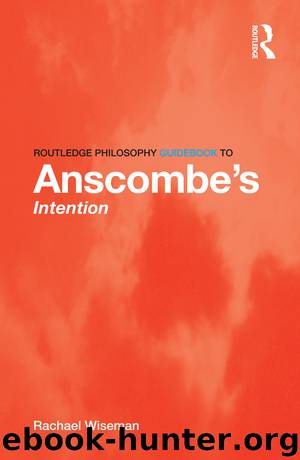Routledge Philosophy Guidebook to Anscombe's Intention by Wiseman Rachael

Author:Wiseman, Rachael [Rachael Wiseman]
Language: eng
Format: epub
ISBN: 9781317309260
Publisher: Taylor & Francis (CAM)
By this criterion, ‘He killed my father’ ‘shews’ – though, as we will see, does not give – a motive, while ‘He jumped out of the broom cupboard’ gives a mental cause. One way to test whether this connection with good and harm holds in a particular case, says Anscombe, is to see whether the explanation is given up or disavowed ‘if you could e.g. show that either the action for which he has revenged himself, or that in which he has revenged himself was quite harmless or was beneficial’ (§14, p. 21–22). We might imagine someone saying: ‘I didn’t invite Ann to the party because she ignored my letter’, but then acknowledging that he had had no reason not to invite Ann once it is pointed out to him either that the letter had never reached her or that Ann despised party invitations. If ‘he ceases to offer a reason’ in such a case, or says ‘I thought that was a reason’ this shows that we are dealing with motive not a cause as ‘no such discovery would affect an assertion of mental causality’ (§14, p. 22). Pointing out that there is no reason to jump at sudden noises does nothing to undermine the causal statement, ‘I jumped because of the loud bang’.
Above I pointed out that while ‘He killed my father’ ‘shews’ a motive, it does not give a motive. This distinction is important in helping to keep clear the difference between motive and cause. ‘He killed my father’ gives my reason, and at the same time shows that I act for the backward-looking motive revenge. The motive of revenge looks backward to some harm that was done to me, which I now take as a reason to harm; that I kill because he killed my father characterises my murder as revenge. This means that an action can be characterisable as revenge even when the agent does not have the concept of revenge; if he harms someone because she harmed him, then this is the ‘primitive, spontaneous’ case (§35, p. 66), and he can be described as taking revenge. A more sophisticated form of revenge involves taking revenge as one’s object. As when one’s intention is to get my revenge (§35, p. 66). In such a case one recognises the harm one was done as a reason for getting revenge, rather than as merely a reason for doing harm.
Anscombe says that when a reason is given up in the light of evidence that, e.g. ‘the action for which he has revenged himself ... was quite harmless or was beneficial’ this also identifies a third class of involuntary actions: ‘If I do something out of revenge which is in fact advantageous rather than harmful to my enemy, my action, in its description of being advantageous to him, is involuntary’ (§14, p. 22).11 It is clear that this kind of involuntary action could not be described without using the concept of intention – given its dependence of the notion of a reason for action, in the form of a backward-looking motive.
Download
This site does not store any files on its server. We only index and link to content provided by other sites. Please contact the content providers to delete copyright contents if any and email us, we'll remove relevant links or contents immediately.
The remains of the day by Kazuo Ishiguro(7551)
Tools of Titans by Timothy Ferriss(6950)
The Black Swan by Nassim Nicholas Taleb(6192)
Inner Engineering: A Yogi's Guide to Joy by Sadhguru(5897)
Giovanni's Room by James Baldwin(5879)
The Way of Zen by Alan W. Watts(5800)
The Six Wives Of Henry VIII (WOMEN IN HISTORY) by Fraser Antonia(4791)
The Power of Now: A Guide to Spiritual Enlightenment by Eckhart Tolle(4756)
Astrophysics for People in a Hurry by Neil DeGrasse Tyson(4620)
Asking the Right Questions: A Guide to Critical Thinking by M. Neil Browne & Stuart M. Keeley(4576)
12 Rules for Life by Jordan B. Peterson(3734)
The Ethical Slut by Janet W. Hardy(3504)
Skin in the Game by Nassim Nicholas Taleb(3462)
Housekeeping by Marilynne Robinson(3402)
The Art of Happiness by The Dalai Lama(3385)
Double Down (Diary of a Wimpy Kid Book 11) by Jeff Kinney(3274)
Skin in the Game: Hidden Asymmetries in Daily Life by Nassim Nicholas Taleb(3264)
Walking by Henry David Thoreau(3235)
12 Rules for Life: An Antidote to Chaos by Jordan B. Peterson(3204)
